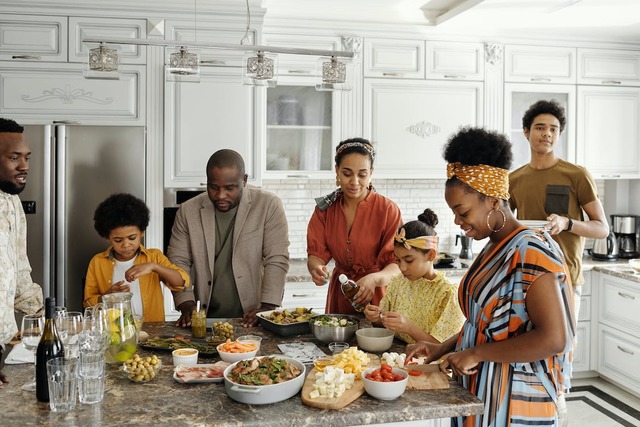Meals for a busy family can be grabbing something on the go or each member of the family fending for themselves. Many don’t have time to cook and it is harder to get time to eat together.
Making mealtimes a priority is important and there is some compelling evidence that supports this. This doesn’t mean you have to make everything from scratch or have three meals a day together before seeing the benefits.
Benefits of Family Meals
Studies and research done around this area have shown that eating meals as a family can help kids emotionally, academically, physically, and socially. Below are some of the benefits your kids can get from this:
Better Physical Health. Studies have shown that kids eating dinner with their parents were less likely to be delinquent, physically aggressive, and oppositional at age 10.
Healthier eating habits. Sitting down and eating has been shown to help in increasing fruit and vegetable intake and also healthier portion sizes for kids. Kids who have healthy eating habits during their childhood are more likely to have them in their adulthood.
- Improved Communication. Teens eating dinner with their parents tend to have better communication with their parents and other members of the family. Studies show that positive daily communication when eating together promotes closeness.
- Fewer unhealthy weight-control behaviors. Those eating with their families have a lower risk of eating disorders.
- Higher academic achievement. Spending time with family during dinner can improve the academic performance of children. Eating with the family has been found to be a good predictor of high achievement scores than when time is spent on doing sports, doing homework, or doing art.
More resilience to bullying. A study found that kids getting cyberbullied were more resilient if they spent time with family during dinner. There was less risk of behavioral problems, mental health problems, and substance abuse when compared to those who didn’t spend dinner time with family.
Fewer high-risk teen behaviors. Family meals can help in reducing a wide range of behavioral issues in teens and adolescents, and this is according to studies. Girls eating with their families were less likely to try drugs. Boys are less likely to commit acts of violence, drink, steal, or destroy property. Both girls and boys are less likely to run away.
Marking it on the Calendar
It is easy for play dates, school activities, and other obligations to take away from meal times. This makes it a good idea to always have “family meal” time on the schedule.
If you choose to spend at least three nights a week eating dinner together, then make sure you have marked it on the calendar. Everyone should know about it. This makes it hard for someone to turn the opportunity down when it comes up. When the weather is great make the most of it with good garden furniture.
There are times when someone has to miss something like soccer practice to spend time with family. There are times when you have to cancel going to a birthday party. While this can upset kids at times, having it on your schedule will help in ensuring it happens.
Making Certain Meals a High Priority
Research has shown eating with family often is better. There was a study on adolescents that showed that when they ate together 5-7 times a week, they were twice more likely to get A’s compared to those who ate together with their families less than two times a week.
It is at times hard for most families out there to get the chance of gathering every night to eat. Find what works for you and your family.
Most of the research done focuses on dinner, but not everyone eats evening meals. If it is hard for you to eat dinner together with your family because of your work schedule, then don’t stress too much about it.
You can choose to have breakfast together with your family. If this is still hard, then choose two dinners a week and make it a priority. Try your best to get everyone to be there for those two nights a week.
Make sure you have a realistic schedule that is going to help in ensuring you spend time eating together. You have to also focus on the quality of your time together as a family.
Assigning Mealtime Jobs
You should involve your kids in preparing, eating, and cleaning up where each child gets assigned a given duty. They will value the time with family more when they feel like they are a part of the team.
- Jobs for younger kids:
- Setting the table
- Clearing the table
- Putting dirty dishes in the sink
- Washing the table
- Jobs for older kids:
- Doing the dishes
- Washing and cutting vegetables
- Sanitizing the kitchen counters
- Preparing salads and simple dishes
- Helping with cooking
- Serving food
The children can rotate chores or you can assign permanent duties depending on what works for your family. Make sure every member of the family pitches in so everyone feels they are part of the team.

Creating Roles for Kids as they Cook Together
Planning Special Family Meals
Your dinner can be a family activity where the kids pick out the menu and take turns. You can let everyone take turns and pick out what you are going to eat for dinner on Sundays. The person choosing the menu can then be involved in the process of reviewing the budget and buying the groceries.
Make the process fun by having a special theme when the child chooses a meal. If you are eating a Latin meal, you can have salsa music playing. Pizza nights can be fun because everyone can make their own miniature pizza.
The goal is to make meal times a time for creating memories with your family and also bonding. These times are going to be in your kid’s memory forever. Allow them to employ their creativity, even when it feels like an added chore.
Establishing Rules
Family time doesn’t have to be about reprimands like “chew with your mouth closed” and “sit up straight”, but you need to make sure there is order.
Establishing simple and clear rules at the kitchen table is important. Some of them include;
Using inside voices
- Sitting at the table until everyone has finished eating
- Using your table manners (teach them the basic skills about using napkins, utensils, and chewing with their mouth closed)
- Being polite about food that they don’t enjoy (this is important because it can prevent kids from influencing each other on what they think is gross)
Banishing Technology from Meal times
It is not a good idea to scroll through social media or eat in front of the TV during a meal. You are going to model unhealthy habits for kids and miss the opportunity of connecting with them.
Studies have shown that young people consume unhealthy foods and drinks more when they are watching TV. Using electronics during meal times can increase the risk of becoming overweight.
Meal times should be screen-free. Shut off the TV, silence your phones, and refrain from using digital devices during meal times.
Enjoying the Conversation
Kids learn a lot from family meal times. They will develop a relationship with food, gain social skills, and learn table manners. You don’t even have to force these ideas and skills on them.
They are going to watch you and follow it too. Your meals should be less about scolding, teaching, and reprimanding. The focus should be more on enjoying spending time with one another.
Creating pleasant conversations by asking members of the family about their day. Meal times can also be unstructured and everyone can share, laugh, and speak freely on any topic they want.
The important thing is making sure that meal times are something that everyone looks forward to and not a chore that involved lecturing about good behavior and proper nutrition.
Listening more than speaking. Quieter kids should be invited to share so everyone gets the chance to talk during this family time.
Creating Traditions and Rituals
The family traditions created during mealtime will be something your kids will keep in their memories forever. Whether it is using your fancy China, doing some meditation or praying with them before eating, there is a good chance they are going to carry those traditions to their adulthood.
You shouldn’t underestimate the importance of family tradition. Those are what separates you from other people. There is no tradition that is too small or too big.
Meal time is a good opportunity to spend more time with the family. You will get the above and more benefits by trying your best to schedule such nights. Getting started might seem hard, but you will find it easier with time. Your family is going to look forward to it.






